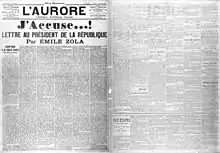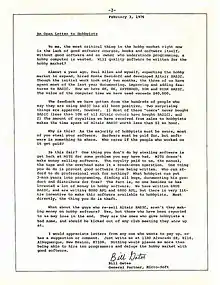Open letter
An open letter is a letter that is intended to be read by a wide audience, or a letter intended for an individual, but that is nonetheless widely distributed intentionally.[1][2][3]


Open letters usually take the form of a letter addressed to an individual but are provided to the public through newspapers and other media, such as a letter to the editor or blog.[4] Critical open letters addressed to political leaders are especially common.
Letters patent are another form of an open letter in which a legal document is mailed to a person by a government and publicized so that all are made aware of it. Open letters can also be addressed directly to a group rather than individuals.
Two of the most famous and influential open letters are J'accuse...! by Émile Zola to the President of France, accusing the French government of wrongfully convicting Alfred Dreyfus for alleged espionage, and Martin Luther King Jr.'s Letter from Birmingham Jail, including the famous quotation "Injustice anywhere is a threat to justice everywhere".[5]
Motivations for writing
There are a number of reasons why an individual would choose the form of an open letter, including the following reasons:
- As a last resort to ask the public to judge the letter's recipient or others involved, often but not always, in a critical light
- To state the author's position on a particular issue[6]
- As an attempt to start or end a wider dialogue around an issue
- As an attempt to focus broad attention on the letter's recipient, prompting them to some action
- For humor value
- Simply to make public a communication that must take place as a letter for reasons of formality
Eric Kaufmann characterizes the authoring of open letters in academia calling for the dismissal of academics as a form of "hard authoritarianism" accompanying political correctness and cancel culture.[7]
External links
References
- "Merriam-Webster's Online Dictionary". Merriam-webster.com. Retrieved 28 July 2014.
- Guerra, Cristela (1 March 2016). "The appeal of open letters and what it says about us - The Boston Globe". BostonGlobe.com. Retrieved 31 May 2020.
- O'Shea, Samara (22 March 2012). "An Open Letter ... About Open Letters". NPR.org. Retrieved 31 May 2020.
- "Macmillan Online Dictionary". Macmillandictionary.com. 22 July 2014. Retrieved 28 July 2014.
- "The rise of the open letter". BBC News. 23 March 2011. Retrieved 31 May 2020.
- "Abhijit Guha | Vidyasagar University - Academia.edu". vidyasagar.academia.edu.
- Kaufmann, Eric Peter (1 March 2021). Academic Freedom in Crisis: Punishment, Political Discrimination, and Self-Censorship (PDF) (Report). Center for the Study of Partisanship and Ideology. 2. Archived from the original (PDF) on 7 March 2021.
Hard authoritarianism entails no-platforming, dismissal campaigns, social media mob attacks, open letters, and formal complaints and disciplinary action, and stems mainly from a subgroup of illiberal far-left activist staff and students. I find that only a small minority of academic staff are protagonists. Figure 1 shows support for cancellation across five surveys and five hypothetical scenarios involving controversial academics.
- Eric Kaufmann (1 March 2021). "Academic Freedom in Crisis: Punishment, Political Discrimination, and Self-Censorship". Center for the Study of Partisanship and Ideology (Executive summary). Archived from the original on 1 March 2021.